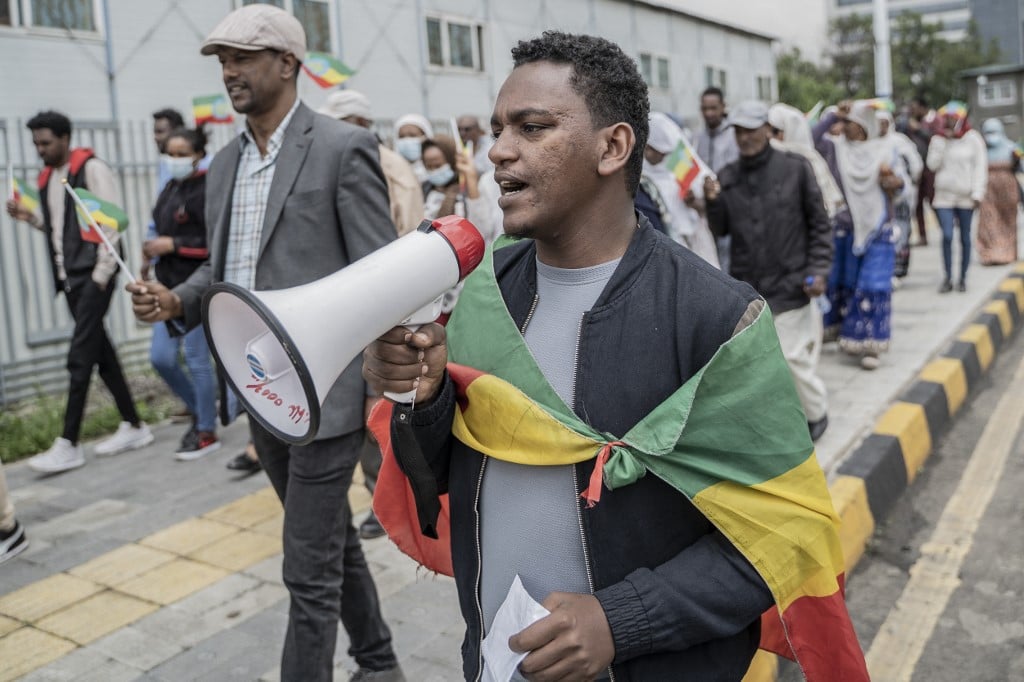The UN secretary-general, António Guterres, has said that the situation in Ethiopia is “spiralling out of control” as Ethiopian and Eritrean forces continue their latest assault on the Tigray region.
On 18 October, Tigrayan forces conceded that they had lost control of parts of the large town of Shire to the Ethiopian military and their allies, although a media blackout of the area makes all claims extremely difficult to verify.
Hostilities in the two-year civil war, which has pitted the Ethiopian federal government and its Eritrean and Amhara allies against forces commanded by the Tigray People’s Liberation Front, have resumed and escalated following the collapse of a roughly nine-month truce in late August. Ethiopia has expressed the intention of capturing airports and other federal infrastructure in the region.

‘No military solution’
On 16 October, the chair of the African Union (AU), Moussa Faki Mahamat, called for an unconditional ceasefire as AU-brokered peace talks struggle to find a solution to the conflict. Both sides agreed to the peace talks in early October but conflict persists.
The following day, Guterres called for hostilities in the Tigray region to end and demanded the immediate withdrawal and disengagement of Eritrean armed forces, who are supporting the Ethiopian government, from Ethiopia.
“There is no military solution,” he said. “Civilians are paying a horrific price. Indiscriminate attacks – including in residential areas – are killing more innocent people every day, damaging critical infrastructure and limiting access to vital services…
“We need the urgent resumption of talks towards an effective, lasting political settlement. The international community must rally together now for peace in Ethiopia.”
Risk of famine
The UN says there is a rising risk of famine, with reports of food running out in the regional capital of Mekelle. It says some 13m were “in need” across a war zone comprising Tigray, Amhara and Afar in the north even before the resumption of hostilities.
In recent days, Western nations have stepped up their criticism of the conduct of the war. On 12 October, a joint statement from Australia, Denmark, Germany, the Netherlands, the UK and the US expressed “profound concern” at the escalation of the conflict and the humanitarian situation in northern Ethiopia.
“We call on the Government of Ethiopia and the Tigray regional authorities to immediately halt their military offensives, agree to a cessation of hostilities, allow for unhindered and sustained humanitarian access, and pursue a negotiated settlement through peace talks under an African Union-led process. We also condemn the escalating involvement of Eritrean military forces in northern Ethiopia. We call on Eritrean forces to cease their military operations and withdraw from northern Ethiopia. All foreign actors should cease actions that fuel this conflict.”
The statement referred to the joint report by the Ethiopian Human Rights Commission and the Office of the United Nations High Commissioner for Human Rights and the recent report of the International Commission of Human Rights Experts on Ethiopia (ICHREE), which documented human rights abuses committed by Ethiopian and Eritrean government forces as well as Tigrayan forces and other armed actors.
“Human rights abuses documented in these reports include unlawful killings, physical abuse, and gender-based violence. We are deeply concerned by the ICHREE’s finding that there are reasonable grounds to believe that starvation of a civilian population has been used as a method of warfare. The resumption of fighting in northern Ethiopia raises a high risk of further human rights violations and abuses.”
In September, ICHREE found “reasonable grounds to believe that the Federal Government was using starvation as a method of warfare“.
US calls for end to hostilities
The US has stepped up its calls for an end to hostilities. On 17 October, Vedant Patel, principal deputy spokesperson at the State Department called on “the Ethiopia National Defense Forces and the Eritrean Defense Forces to immediately halt their joint military offensive and for Eritrea to withdraw its forces from northern Ethiopia. And we further call on the Tigrayan Defense Forces to cease any additional provocations at this time.”
The comments followed a series of tweets from USAID administrator Samantha Power, who warned of the potential for further atrocities if the offensive continues.
Airstrikes take toll on civilians
The use of airstrikes in the Tigray region risk seriously exacerbating the already devastating impact of hostilities on civilians, the UN high commissioner for human rights, Volker Türk, warned on 18 October. Among those killed in recent incidents was a staff member of the NGO International Rescue Committee, who was part of a team delivering humanitarian assistance to women and children.
“Since 31 August we have received numerous reports of civilian casualties and destruction of civilian objects due to airstrikes and artillery strikes in Tigray – disruptions to communication make it particularly difficult to verify reports, but it is clear that the toll on civilians is utterly staggering,” Türk said.
Want to continue reading? Subscribe today.
You've read all your free articles for this month! Subscribe now to enjoy full access to our content.
Digital Monthly
£8.00 / month
Receive full unlimited access to our articles, opinions, podcasts and more.
Digital Yearly
£70.00 / year
Our best value offer - save £26 and gain access to all of our digital content for an entire year!
 Sign in with Google
Sign in with Google 



